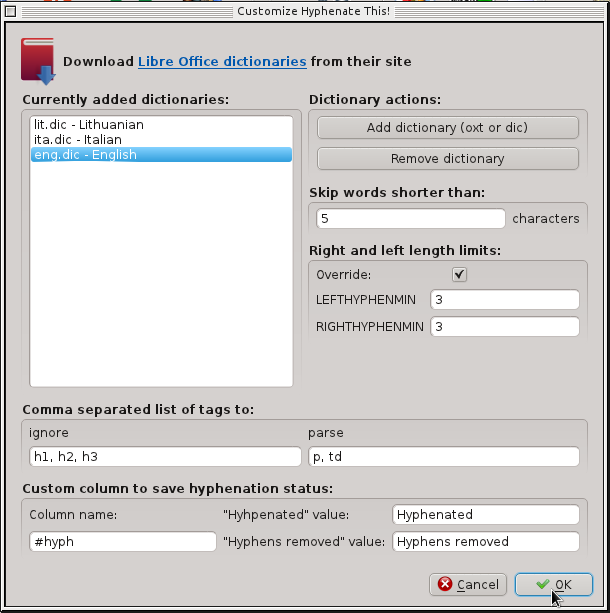Install plugin and download "OXT" dictionaries from link above. Open plugin's settings via menu and add those dictionaries. After dictionaries are added to the plugin, downloaded files are removed, plugin stores hyphenation information inside it's settings directory.
NOTE. You may also add hyphenation dictionary directly, i.e. appropriate "DIC" file, extracted from "OXT" (OXT is simly a ZIP file). "DIC" file must be named "hyph_<language code>.dic". E.g. "hyph_en_US.dic" or "hyph_ru.dic".
NOTE 2. I have tested lots of "OXT" dictionaries. Surprisingly, some of them include hyphenation file, but it is not included in the descriptor (plugin uses descriptor to find out the hyphenation dictionary inside "OXT" archive). So if you add "OXT" dictionary, but no new dictionary appears in the list, try to open "OXT" file with some archive manager and search for "hyph*.dic" file there. If it is present, extract it and add directly. If not, you're not lucky.
Settings window:
 Simple part:
Simple part:
Install or remove dictionaries here and specify the minimum length of the word to be hyphenated.
Advanced part:
Hyphenation limits
Some of the hyphenation dictionaries contain special directions: LEFTHYPHENMIN and RIGHTHYPHENMIN. They limit syllable length on either left or right side of word. Example in the picture is 2 characters on left (overwritten with 3) and 3 characters on right for English dictionary. Some dictionaries do not contain these directions, then default limit is 2. If you don't like default or included limits, you can edit limits for each dictionary separately by marking "Override" tick mark.
Tags to ignore/parse
Some people pointed out, that there is no real (and aesthetic) need to hyphenate chapter names. Those are usually enclosed in heading tags: h1, h2 etc. I have added possibility to ignore any tags. Defaults are three headings.
You might also want to hyphenate only particular tags' content. In the example these are p and td (paragraph and table cells).
Special note. If in the "parse" tags you enter
p, that means all paragraphs will be parsed and hyphenated,
including their child tags, like
span, em, strong etc. If you want some special tags to be ignored inside
p, add them to "ignore" list. In such case you might configure some particular tags inside
p to be ignored, like
em, for example.
Custom column
Hyphenation status can be saved to custom column of type "Text, column shown in the tag browser". User also can define, what to write to that custom column, when hyphenation was performed and when hyphens were removed. If column name is empty, status is not written anywhere.
Next, everything is simple. Choose book with EPUB and/or AZW3 formats, click plugin's icon, choose one of the formats and click OK. Book will be hyphenated. There is also handy action to remove soft-hyphens from book via menu.